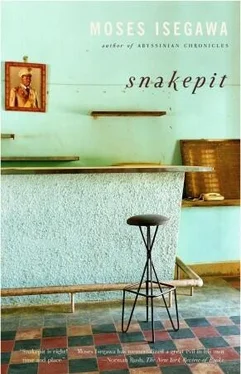Much to her surprise the man did return her call, and expressed deep regret. He chatted. Bat had called him to congratulate him on becoming MP. He had sent Bat greetings on a few occasions. He promised to study the case.
THE FIRST TWO WEEKS in detention slipped by steeped in suspense, boredom, fear. His spirit felt compressed, cut off, strangled by the weight of isolation. A candle starved of oxygen slowly going out. His own company depressed him. His mind tried to roam outside, a bird without a song or a worm. He kept thinking that man was a strange animal: in a group he often sought isolation; isolated, he did his best to fit into the group. How many hours did he spend thinking about people he normally fled or whose company he found mediocre? How many hours did he spend re-creating banal conversations, images he had found boring at the time? He tried to concentrate on clinical things, reasoning his way out of the maze.
The knowledge that government was doing business just a few floors above him brought with it a crushing sense of redundancy, insignificance. The thugs could do their demolition job without his forlorn efforts to keep some things running. The Ministry of Power hadn’t collapsed: delegations were being sent abroad, deals were being cut, the machinery grinding on, just a few blocks away, in his own office. As he wasted away, he tried to imagine what he would do if suddenly released. It had happened to others. Would he go abroad and seek asylum in Britain or America? Did he want to leave the country? No. He wanted to stay.
He wasted hours going over calculus, various mathematical theorems, geometry. He remembered that when he was young he used to believe that it was the British who had discovered mathematics and was later surprised to learn that it had started in Arabia. And that writing began in Baghdad. He remembered the sand of the Arabian Peninsula as he constructed tunnels, calculating the depth, the width, the time it would take to dig so much each day. He devised the most efficient means of waste disposal. He planned escape attempts using a climber’s gear, helicopter rescue, smoke grenades, massive shoot-outs in which he would have to depend on the expertise of other people, as other people depended on his own expertise at the office.
He felt no bitterness towards the General; it cost too much precious energy. He just excised him from his mind, his life. He liked to think of his tormentors as a group in order to avoid hating them too much, seeing their faces in his sleep. From the flimsy residues of his Catholicism, he dredged enough stoicism, saintly resignation, to accept his punishment. Good people got punished; so did bad ones. That was the beauty of it. He now and then went over his life, the class wall he had built to protect him and his interests, and tried not to lose hope. He tried to look for those moments which would fortify him, keep his spirits up. They kept shifting, changing position according to mood.
He thought a lot about justice; it did not make much sense. He was living outside the bounds of book justice; most Ugandans, most people groaning under dictatorships of all sorts, did. In many places it was the criminals handling the apparatus of justice, meting out their version of book justice. I am also compromised. By accepting the Saudi prince’s money I participated in corruption, albeit involuntarily. Now I am being punished by criminals, killers with dripping hands. It did not make much sense. Salvation lay in the passivity and patience of a crocodile. Maybe something will happen and I will be free to go and do my work.
In the fourth month, when he had quit thinking about Babit, his family, his former life, because it disturbed his equilibrium, a soldier entered his room deep in the night. He switched on the light and barked at him to wake up.
“Job. Exercise. Good for body.”
He marched out of the room. He felt weak in the knees with fear. At the end of the corridor were five other men. He knew them by sight. They stood under the light looking at the soldiers.
“Move.”
They were herded together towards the garage and then outside into the yard. The air was cold, fresh, the sky a marvellous deep blue dipped in twinkling icy stars dominated by a fat moon. It was a very quiet night, with no shooting, no shouting. Bat felt momentarily free. Fantasies and memories rushed to the surface. His body tingled with excitement. He was then pushed inside a Stinger, which cruised past his office and entered the gates of the Nile Perch Hotel. He saw the spot where he had left his XJ10 and tried not to think who owned it now.
They were herded inside the hotel. He found himself in a room with two other men. The sight at his feet made his legs buckle. There were six bodies on the floor. He realized that he was standing in blood, pools of it.
“What are you looking at? Roll them in blankets and take them outside. Quick,” a soldier with a very nasty voice barked, gesticulating fiercely with his hands.
Bat did not know how he brought himself to do the sordid job. It was an out-of-body experience, something the brain washed clean and locked away in order to preserve its sanity. It was heavy lifting, with sandals squeaking, slipping on the marble floor. Outside, a lorry was parked, tail-gate open. They hoisted the bundles, coming away sodden, panting. He stood at the side and looked out. The dome of the mosque on Kibuli Hill looked imposing, like a huge egg. They were ordered to climb in the back together with four armed soldiers. The lorry drove away towards Jinja Road. The cold air whipped in through the slats and over the tail-gate. Everybody shivered, teeth clattering. The soldiers smoked to keep the demons at bay, to generate heat in their bodies and to fight the stink.
He had been on this road before, going to visit Babit’s parents. He remembered the last time, the reception, the joy, the going home with Babit. Now he was going to pass right by those people. He thought about jumping off, an impossibility. But he had convinced himself that he did not care if he got shot or not. Had he not seen it all? What did he have to look forward to? More money? More power? More love? Would the rest of his life not be just nostalgia, the re-created taste of familiar stuff?
The vehicle entered Mabira Forest with a squeal of abused gears. The driver went faster. The massive forest looked even more formidable, more ominous, more pregnant with secrets of life and death. The overpowering darkness was opposed only by the headlights and the groan of the engine.
They swerved off the main road. Tree limbs whacked the side of the lorry and the top slats. They stopped. For a moment nobody moved or talked. A rifle clattered against the tail-gate, sending chills down spines. Then two soldiers barked orders at once. Grabbing a head, Bat led the way, stumbling, hurting his legs on sharp sticks. The human cargo was dumped, naked, the blankets taken back for further use. The soldiers smoked, puffing away, doing their best not to look. Everybody seemed eager to get away.
The next stop was at a river on the edge of the forest.
More orders: Wash blanket. Wash lorry. Wash self.
They washed the blankets, glad that they were thin. They scrubbed the lorry floor, the sides, the tail-gate, while fighting the mosquitoes and other biting and stinging insects of the night. They finally got into the lukewarm water to bathe off the filth which they could no longer smell. It took them an hour of endeavour to get everything ready. They shivered all the way back to the hotel. There they had to wash the rooms, the corridors, the entrance.
“Cleaning woman’s job. You still long way off, you pussies,” one soldier said.
They were given new clothes and sandals before being taken back to Parliament.
It became a fortnightly event. Each time he was sent out with different prisoners. What happened to the others? Was there no end to the number of people held here?
Читать дальше











